Last Updated on June 20, 2024 by Michelle
I needed an organic bug spray, fast, or the caterpillars were going to put an end to my sunflowers that lined the border all around my garden..
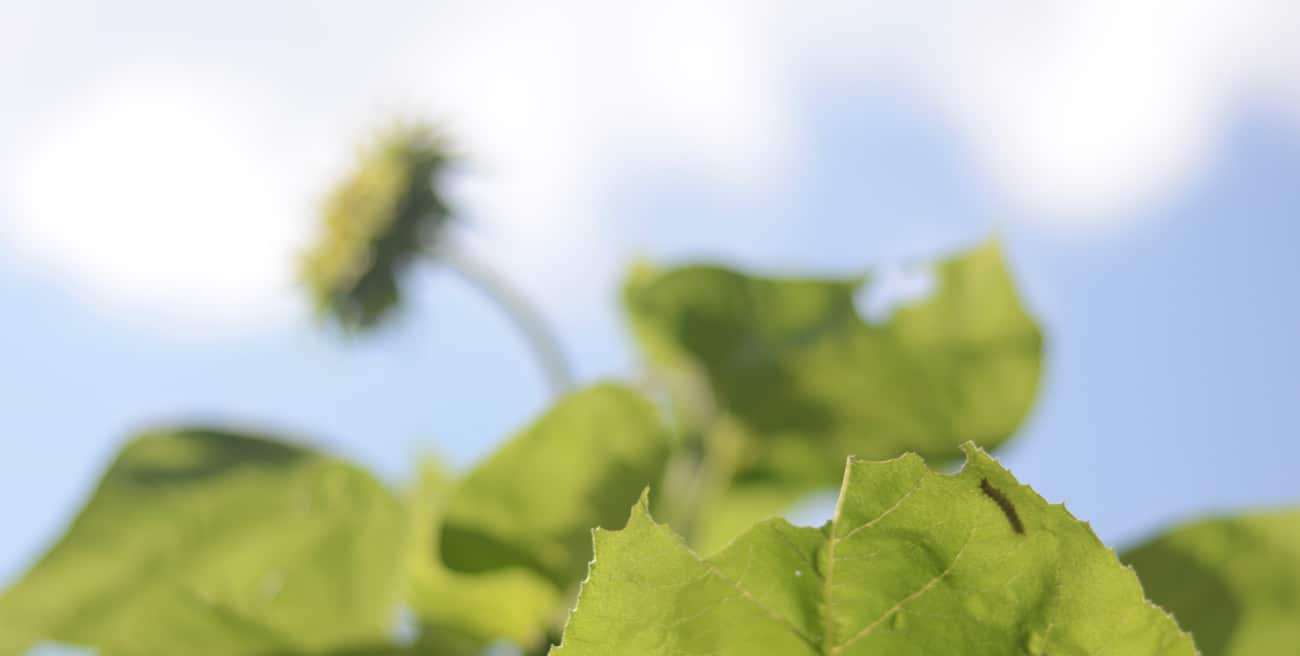
But of course it had to be organic.
I get pretty worked up when I read reports like this one that explain we are all carrying around chemicals in our body every day from pesticide exposure. I insist that our garden has to be chemical free, and this organic bug spray makes that possible.
Why Do Flowers Matter in a Vegetable Garden?
Of course I want the veggies to be chemical free, but are flowers that important?
Yes! I love having sunflowers, zinneas, hollyhocks, and foxglove in my vegetable garden for two reasons.
One, I need to feed our bees, if I want wonderful reserves of honey next spring. (Read more about our beekeeping experiences here.)
And two, I want to attract the bees to the vegetable garden so they spend their time there. It’s been pretty amazing how productive the garden has been thanks to the pollinating help of our bees.
So my sunflowers are pretty important to me, not to mention they’re gorgeous.
Signs of Pests
As soon as I saw the little black droppings on a few leaves and the large areas of a few leaves that had been eaten–both signs of caterpillar infestation–I knew I had to hit the kitchen to concoct some organic bug spray.
Yes, the kitchen.

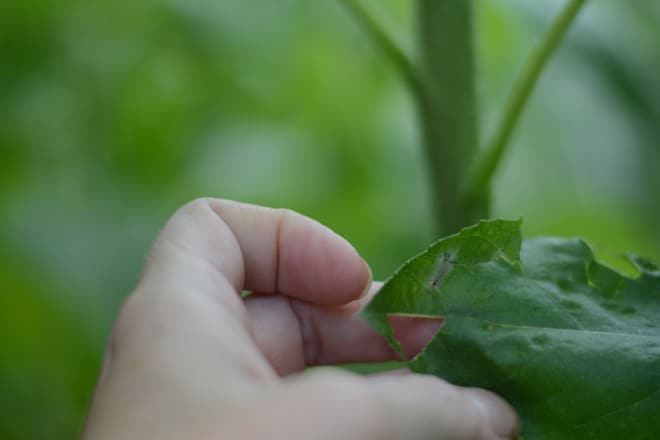
After inspecting the leaves above the droppings and squishing the caterpillars I uncovered, I went to mix up some nasty-smelling spray to safe guard my yellow garden sentinels.
It was bad enough that just the week before I had discovered a few sunflowers near the fence had been eaten by some intruding deer.
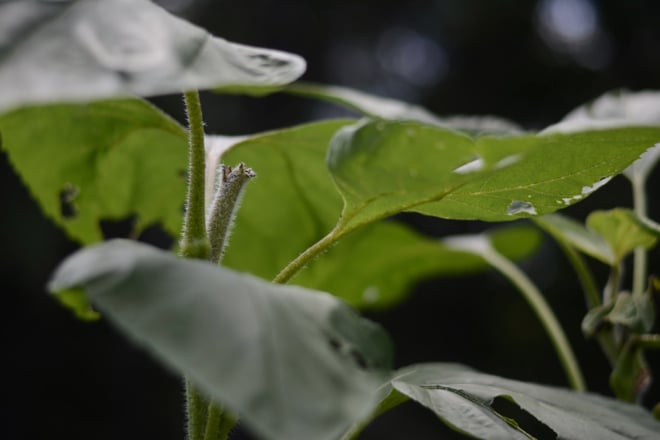
I was determined to save these flowers this year and ensure I had lots of delicious sunflower honey next year. I would imagine the taste of my spray concoction will deter deer while killing the pests, but here are other great ways to keep deer out of your garden as well.
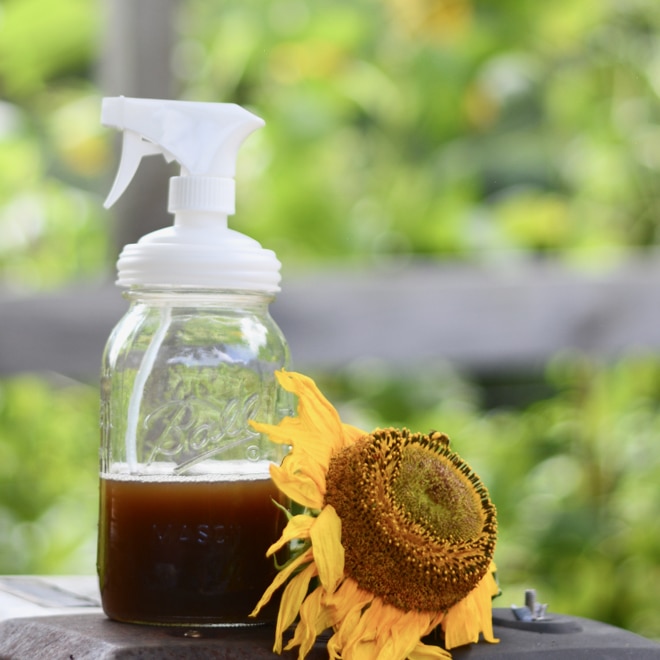
This post contains affiliate links. Go here to read the full (ultra fun) legal disclosure about that.
Does This Spray Work on Many Pests?
While I needed a caterpillar control measure in this situation, I’ve since used this spray on multiple pests, especially aphids and squash beetles, and I find if I drown the destructive critters in this odious stuff it does the trick.
For a spray like this to be most effective on squash beetles, you should try to spray the soft-bodied infant beetles. The adult hard-shelled ones may need more drastic measures, which I’ll be sharing in an upcoming post. Although, while I say that I also am thinking of my friend, Kathy, who faced a devastating onslaught of nasty, hard-shelled blister beetles this summer. She insists that my spray spared her crops and destroyed the beetles, so yay!
Ladies and gentlemen, I think this totally organic, easily accessible option is genuinely effective fighting even the nastiest of bugs!
I read lots of sources to find common, natural ingredients that I would have on hand yet would be effective in my battle against the bugs. This combination has been doing the trick for years now in my garden:
My Organic Bug Spray Concentrate
Ingredients
1/2 onion
1/2 pepper (the hotter the better, but I used what I had on hand)
4 cloves garlic
1 cup dried mint (I show you how I dry my own here)
2 TBS pepper flakes (dried)
2 cups water
Directions
Pulverize all the ingredients (I use this processor) then let your nasty concoction sit in the food processor overnight.
In the morning, squeeze the juices through cheesecloth or if, like me, you don’t have cheesecloth around, you can use an old thin cloth.
The juice you’re left with is your pepper juice. Your concentrated weapon against the pests that are destroying your garden.

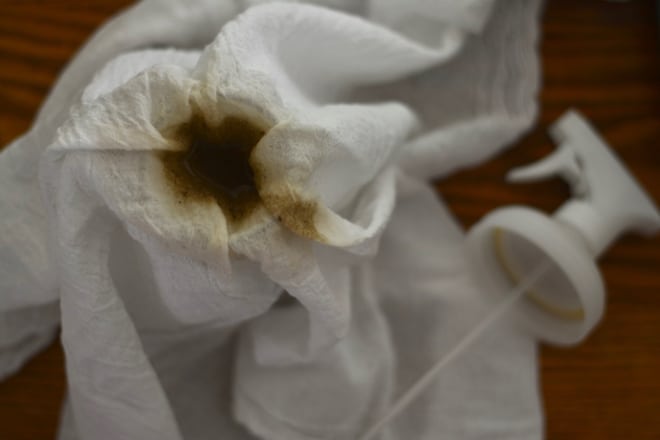
How to Use the Concentrate
Once I made my concentrate, I divided it between two 1/2-gallon jars, then soaked the contents of my cheesecloth in a bowl of 1 gallon of water for another night, which I added to my concentrate the next day. This was probably overkill, but I felt there was still life in the scraps and hated to not use it all well.
Add 1 TB liquid dish soap and 1/2 cup full-strength concentrate to a quart jar. Fill with water and screw on a spray nozzle. I purchased my spray lid, that fits on any mason jar, as part of this kit. (I love the flip lids for storing my DIY Taco Seasoning and my Lilac Sugar.)
Test your spray on a small area of a plant to make sure the plant takes well to this nasty smelling stuff. And take care to keep your spray away from the bees and other important pollinators.
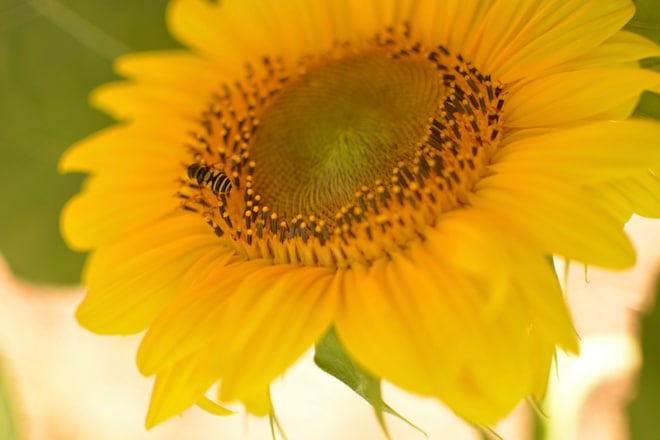
Why I Use Glass Instead of Plastic for This Spray
Whenever I can, I use glass instead of plastic anyway, since it’s considered to be safe for use with almost any kind of product. But in this case I prefer glass for this odious-smelling bug spray because glass doesn’t absorb the ingredients, so when it is washed out / sanitized , it can be used for other purposes.
Yes, the spray nozzle I found in this kit is costlier than grabbing a dollar store plastic bottle, but it is so much more substantial. And glass has a much longer life span than those cheap plastic bottles, which means that it won’t have to be replaced as often.
8 Things You Need to Know about Garden Pests
I dive into 8 things everyone should understand about pests in the garden if you want to battle them effectively in this podcast right here:
More Gardening Articles:
6 Herbs I’m Growing for Us & Our Chicken This Year
What Every Gardener Needs to Know About Egg Shells
What Every Gardener Needs to Know About Coffee Grounds
I know that there is nothing better for people than to be happy and to do good while they live. That each of them may eat and drink, and find satisfaction in all their toil—this is the gift of God. Ecclesiastes 3: 12-13
Pin this for later!
Click on the image below to pin this post.
Find out why SoulyRested was considered to be one of the Top 20 Must-Read Homesteading Blogs of 2018 and then one of the Top Homesteading Blogs of 2019 as well.
Glance at my Resource Page if you’d like to get a glimpse of all the supplies I use and recommend for everything from gardening, to homeschooling, to chicken care, to nature journaling, to maple syrup making.
I’d love to connect!
To find me in some other neck of the woods, just click any (or every!) icon below:
And please join in on my resource library. I’m often adding sweet bonuses.


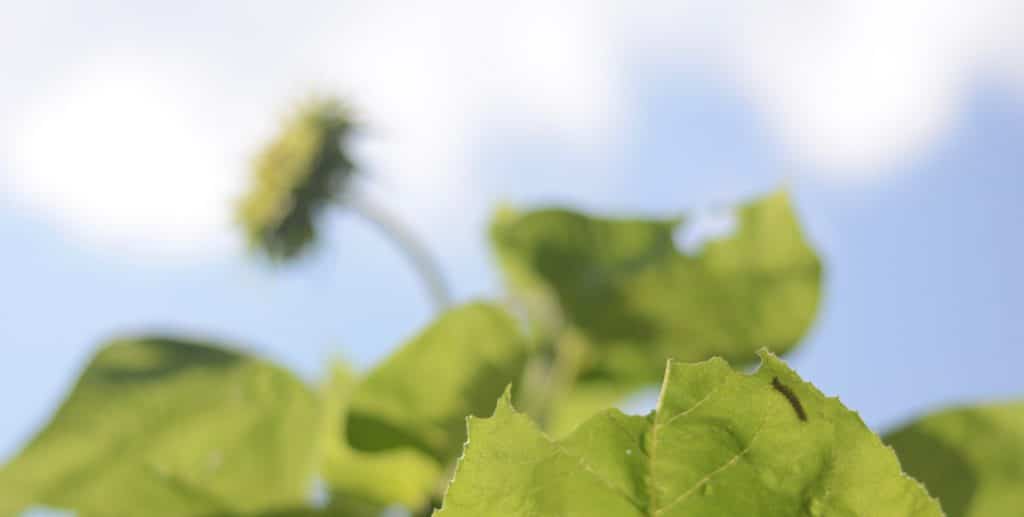
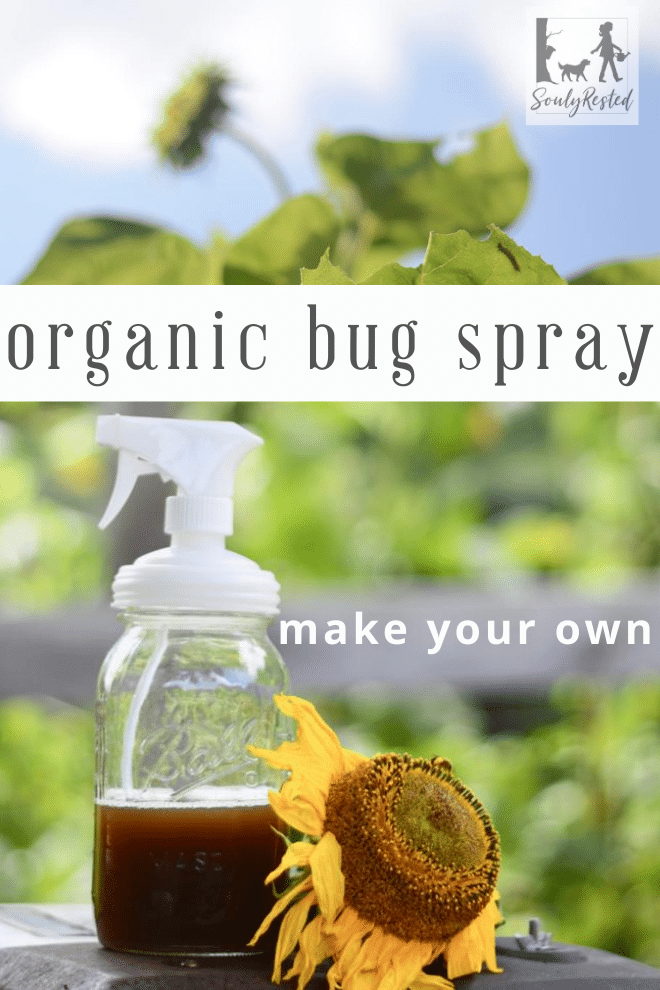





Will this harm roses? I have roses I planted last year, and this year, the leaves have been completely decimated by something (maybe the white spiders I see on the flowers??)
I’m totally new to any type of garden, but want my roses to flourish as they are heirloom and were very expensive.
I love roses but I despise growing them. I tried the first few years of our marriage and gave up on my battle with the Japanese beetles. Never planted roses any other place I’ve lived. So I can’t tell you BUT I know you can try this spray on a small section of any plants and observe it closely for a few days to see if it’s helping or hindering and then go from there… I hope you get it figured out!
Does this spray work for aphids on lettuce or is it too “hot” for lettuce?
hmmmmm I’ve been blessed enough to never have to spray my lettuce, so I’ve never tried. But it’s such an effective spray I would definitely try it on just one small section and watch to see if it harms the lettuce. I’m betting if you spray in early evening, as soon as the sun is off the lettuce, and give it plenty of time to work before the sun is beating on the plants again it might do very well. If you try, please let me know!